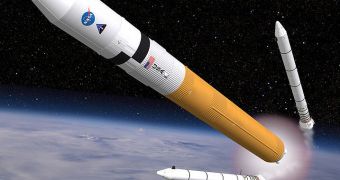The American space agency could get an additional $3 billion in funding for the development of a heavy-lift delivery system to be used in upcoming missions. The organization may also get $350 million in space sciences funding boosts.
This would raise the total NASA budget for the remainder of the fiscal year to no less than $18.53 billion. However, there are no guarantees that these sums will be alloted, since it's only this week that the bill proposing the boosts will pass through the US Senate.
How much money NASA gets per year is a critical factor for determining the future of the American space program, and the fate of numerous planned missions that have been waiting on the sidelines for a very long time.
Some of the missions that the agency will conduct in the near future include the launch of the Mars Science Laboratory and the Jupiter-bound Juno spacecraft this year, as well as the launch of the MAVEN orbiter to Mars in a couple of years.
There are of course numerous other satellites that also need to launch, and NASA is being hard-pressed by the National Research Council (NRC) to produce a flag-ship mission to Jupiter or Uranus, and to conduct more astrobiology investigations on the Red Planet.
At the same time, the space shuttles need to be retired, and America will lose access to space for the next few years. This means additional expenses, as the agency will need to pay the Russians for seats on their Soyuz space capsules.
But the new bill could alleviate some of these costs. The Senate bill is different from the one that passed though the House a little while back, in the sense that it gives NASA more money.
It adds $170 million to the $1.63 billion recommended for constructing a heavy-lift rocket, and provides an additional $1.2 billion for the development of the Orion Multi-Purpose Crew Vehicle, a part of the former Project Constellation, that is now canceled.
The Senate version of the bill also boosts space science spending to $4.81 billion, a $350 million increase from the House version of the document. Still, this is less than the $5 billion President Barack Obama and Congress wanted to allot for this field.
In the document, more than $5.74 billion are allotted for flying the final two shuttle missions, Endeavor and Atlantis', as well as for operating the International Space Station (ISS).
It still remains to be seen how the new bill version will fare. Analysts estimate that discussions will be heated, and that the document will not be adopted in its current form. At least some modifications will be included, Space reports.

 14 DAY TRIAL //
14 DAY TRIAL //